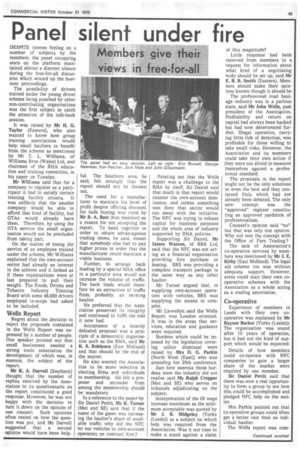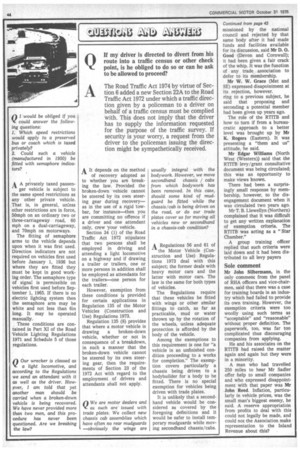Panel silent under fire
Page 45

Page 46

If you've noticed an error in this article please click here to report it so we can fix it.
DESPITE intense feeling on a number of subjects by the members, the panel occupying seats on the platform maintained almost a discreet silence during the free-for-all discussion which wound up the business proceedings.
The possibility of drivers trained under the young driver scheme being poached by other non-contributing organisations was the first subject to catch the attention of the talk-back session.
It •was raised by Mr H. G. Taylor (Eastern), who also wanted to know how group training associations would help small hauliers to benefit from the scheme as mentioned by Mr E. L. Williams, of Williams Bros (Wales) Ltd, and chairman of the RHA education and training committee, in his paper on Tuesday.
Mr Williams said that for a company to register as a participant it had to satisfy certain training facility criteria. It was unlikely that the smaller company would be able to afford that kind of facility, but GTAs would already have them. Therefore, by using the GTA service the small organisation would not be precluded from taking part.
On the matter of losing the service of an employee trained under the scheme, Mr Williams explained that the own-account sector had already an interest in the scheme and it looked as if these organisations were at last prepared to pull their weight. The Foods, Drinks and Tobacco Industry . Training Board with some 48,000 drivers employed in-scope had asked to be included.
Wells Report
Regret about the decision to reject the proposals contained in the Wells Report was expressed by a number of people. One speaker pointed out that small businesses needed a strong trade association the development of which was, in essence, the subject of the report.
Mr K. A. Darvell (Southern) thought that the number of replies received by the Association to its questionnaire on the report constituted a good response. However, he was not happy with the decision to turn it down on the opinion of one counsel. Such opinions often rested on how the ques tion was put, and Mr Darvell suggested that a second opinion would have been help ful. The Southern area, he said, felt strongly that the report should not be thrown out.
The need for a manufacturer to maintain his level of profit despite offering discount for bulk buying was cited by Mr R. A. Butt (lion member) as a reason for not accepting the report. To band together in order to obtain advantageous trading terms, he said, meant that somebody else had to pay higher prices in order that the manufacturer could maintain a viable business.
Further, to arrange back loading by a special RHA office in a particular area would not increase the volume of traffic. The back loads would therefore be an extraction of traffic from, probably, an existing haulier.
He preferred that the Association preserved its integrity and continued to fulfil the role it now had.
Acceptance of a heavily defeated proposal was a principle of a democratic organisation such as the RHA, said Mr K. S. Robinson (East Midland) and that should he the end of the matter.
He also wanted the Association to be more selective in electing firms and individuals to membership. He felt a proposer and seconder from among the membership should be mandatory.
In a reference to the paper by Sir Daniel Pettit, Mr K. Turner (Met and SE) said that if the name of the game was increasing the haulier's share of available traffic why did the NFC let out vehicles to own-account operators on contract hire ? Pointing out that the Wells report was a challenge to the RHA by itself, Sir Daniel said that much in that report would counter the own-account dominance, and unless something was done that sector would run away with the initiative. The NFC was trying to release capital for business purposes and the whole area of industry supported by RHA policies.
Supporting Sir Daniel, Mr James Watson, of BRS Ltd, said that the NFC was not acting as a financial organisation providing hire purchase or leasing. BRS was providing a complete transport package in the same way as any other haulier.
Mr Turner argued that, in supplying own-account operators with vehicles, BRS was supplying the means to compete.
Mr Llewellyn said the Wells Report was London oriented. It was in the areas that services, education and guidance were required.
Burdens which could be imposed by the legislation covering unfair dismissal were raised by Mrs D. G. Parkin (North West (East)) who was attending her 25th conference.
Just how onerous those burdens were the industry did not realise said Mr Ralph Cropper (Met and SE) who serves on tribunals adjudicating on the subject.
Interpretation of the £6 wage increase maximum as the minimum acceptable was quoted by Mr J. B. Midgeley (Yorks (Leeds)) as a subject on which help was required from the Association. Was it not time to make a stand against a claim of this magnitude?
Little response had been received from members to a request for information about what kind of a negotiating body should be set up, said Mr E. B. R. Smith (Eastern). Members should make their opinions known though it should be The professional road haulage industry was in a parlous state, said Mr John Wells, past president of the Association. Profitability and return on capital had always been backed but had now deteriorated further. Illegal operation, carrying little risk of detection, was profitable for those willing to take small risks. However, the Association and its members could take their own action if they were not afraid to measure themselves against a professional standard.
The proposals in the report might not be the only solutions or even the best and they contained little which had not already been debated. The only new concept was the "approved" register constituting an approved yardstick of professionalism.
Counsel's opinion said "no" but that was only one opinion. Why not rest the concept with the Office of Fare Trading?
The lack of Association's co-operative services by members was mentioned by Mr J. E. Kirby (East Midland). The legal aid scheme too was without adequate support. However, areas could start their own cooperative schemes with the Association as a whole acting as a trading association.
Co-operative
Experience of members in Leeds with their own cooperative was explained by Mr Raynor Barker (Yorks (Leeds)). The organisation was sound after 15 years of operation, but it had not the kind of support which would be expected.
Details of how members could co-operate with NFC companies to gain a larger share of the market were required by one member.
Sir Daniel Pettit said that there was now a real opportunity to form a group to see how this could be accomplished and pledged NFC help on the matter.
Mrs Parkin pointed out that co-operative groups could often get a better rate than an individual haulier.
The Wells report was corn missioned by the national council and rejected by that same body after it had made funds and facilities available for its discussion, said Mr D. 0. Good (Devon and Cornwall); it had been given a fair crack of the whip. It was the function of any trade association to defer to its membership.
Mr W. W. Grace (Met and SE) expressed disapointment at its rejection, however.
ring to a previous subject, he said that proposing and seconding a potential member had been given up years ago.
The role of the RTITB and how to turn if from a bureaucratic approach to a better level was brought up by Mr K. Rogers (Eastern). It was presenting a "them and us" attitude, he said.
Mr Edgar Williams (North West (Western)) said that the RTITB levy/grant consultative document was being circulated; this was an opportunity to make views known.
There had been a surprisingly small response by membership, however, to the disengagement document when it was circulated two years ago.
Mr T. B. Llewellyn (Northern) complained that it was difficult to get any written explanation of exemption criteria. The RTITB was acting as a "Star Chamber."
A group training officer replied that such criteria were laid down and it had been distributed to all levy payers
Sole comment
Mr John Silbermann, in the only comment from the panel of RHA officers and vice-chairmen, said that there was a case for training boards in an industry which had failed to provide its own training. However, the exemption criteria were too woolly using such terms as "acceptable" and "reasonable" without proper definition. The paperwork, too, was far too complicated thus discouraging companies from applying.
He and his associates on the RTITB had raised the matter again and again but they were in a minority.
A man who had travelled 250 miles to hear Mr Sadler offer help to small companies and who expressed disappointment with that paper was Mr John Reed. Inflation, particularly in vehicle prices, was the small man's biggest enemy, he said. A reserve appropriation from profits to deal with this could not legally be made, and could not the Association make representation to the Inland Revenue about this?
































































































